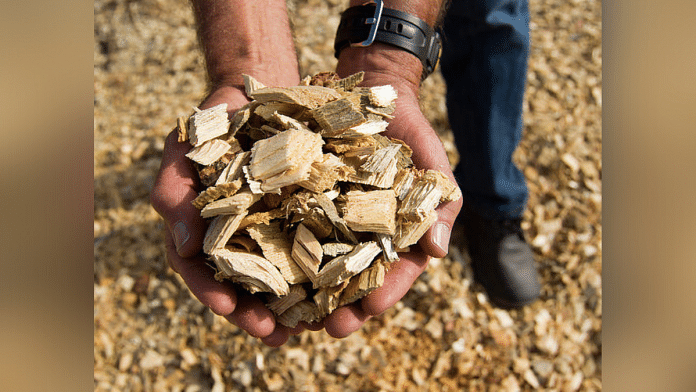New Delhi: Researchers from Indian Institute of Technology, Guwahati have found that a specific enzyme can effectively convert woody biomatter into bioethanol — a renewable fuel which can even be used as a substitute for petrol or in food medicine.
With dwindling fossil fuel reserves and climate change heaving upon the world, adopting clean strategies with renewable fuel is the need of the hour. Ethanol or ethyl alcohol is not just used in spirits, drinks or pharmaceutical products, but can also be used to fuel vehicles.
The enzyme known as RfGH5_4, which was derived from a bacterium called Ruminococcus flavefaciens, effectively breaks down the cellulose and hemicellulose in woody biomatter and converts it into bioethanol. This bacterium is found in the gut of cows and other cud-chewing animals.
The efficiency of the enzyme, RfGH5_4, was tested by breaking down and fermenting molecules of biomasses such as main stalk and small branches of cotton, sorghum stalk, sugarcane bagasse, finger millet stalk and maize leaves, into simple sugars.
While chemical processes can be used to manufacture bioethanol fuel, it is usually produced by fermentation of sugar, normally sourced from fuel or energy crops such as corn, maize, wheat, potato among others.
The study was a collaboration between IIT-Guwahati and University of Lisbon in Portugal, the results of which were published in the International Journal of Biological Macromolecules, in October.
Led by Professor Arun Goyal of Department of Biosciences and Bioengineering, IIT Guwahati, the study shows that large amounts of organic carbon are stored in agricultural and plant biomass in the form of molecules like cellulose and hemicellulose.
The research is significant as it can help India lower its dependence on crude oil imports, which currently stands at 85 per cent. Domestically produced ethanol can be blended with petrol to drastically reduce the reliance on other countries. India hopes to bring in 20 per cent ethanol blending with gas in some parts of the country by 2023, followed by a pan India rollout in 2025-2026.
More uses of the enzyme
Going one step towards finding more sustainable alternatives to using non-renewable sources of energy, these findings will not only convert wasted residual biomass into an effective resource to fuel cars, but can be used in food medicine as well.
It can also be applied to other things such as the food and pulp industries, pharmaceuticals, textiles among others.
“Agricultural residual biomasses are wasted or burned causing various environmental hazards including global warming and climate change. Their deconstruction by RfGH5_4 might extend its usage in food medicine as well”, Professor. Goyal said in a statement Tuesday.
The authors say that the enzyme is multifunctional and proved to be an efficient catalyst. This makes it stand out from other enzyme groups present in nature, and available commercially. What also stood out is that the enzyme remained stable at temperatures between 5 degrees Celsius and 45 degrees Celsius, making it widely applicable.
Parmeshwar Gavande, PhD Research Scholar and the First author of the study stated, “The structure of RfGH5_4 was deciphered using extensive molecular dynamics and computational approaches at Param-Ishan Supercomputer facility of IIT-G. RfGH5_4 was found to contain some highly flexible loops in its core structure making room for different carbohydrate polymers during the reaction, thus imparting the multifunctionality to the enzyme.”
These findings suggest that this enzyme may go a long way in providing a cost-effective production of bioethanol on an industrial scale.
Also read: IIT Guwahati researchers create edible coating to boost shelf life of fruits, vegetables



